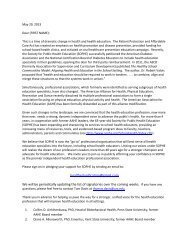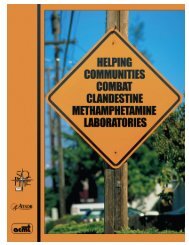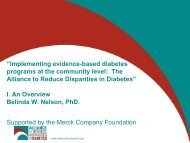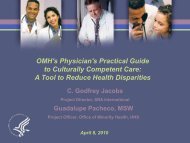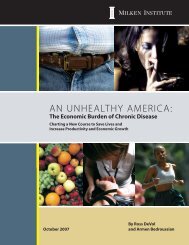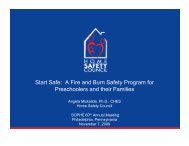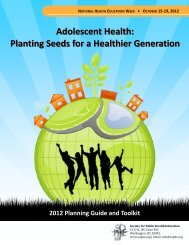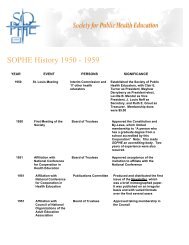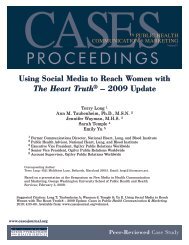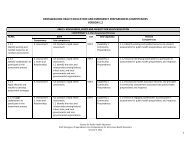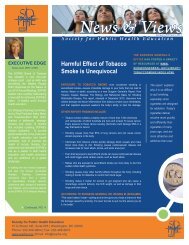Download - Society for Public Health Education
Download - Society for Public Health Education
Download - Society for Public Health Education
- No tags were found...
Create successful ePaper yourself
Turn your PDF publications into a flip-book with our unique Google optimized e-Paper software.
Conference Abstractsand ASTS. Small colleges had significantly lower scoresthan did medium and large schools. Urban schools hadsignificantly lower scores than did nonurban schools. Therewas a significant positive association (p < .05) between therespondent’s satisfaction with asthma services and ASTS.Significant barriers included lack of understanding of chronicdisease management, limited accessibility, and insufficientresources. Top recommendations were standardizingasthma management at campus health centers, <strong>for</strong>mingcampus and community partnerships to share resources,and providing better asthma education. Conclusion: Itappeared that, on average, there was not adequate asthmaeducation and management in NYS colleges. Implications<strong>for</strong> Practice: Recommended is a systems approach to asthmacare including campus and community partnerships, writtenstandards, computerized surveillance and tracking, and useof age-appropriate educational materials and social media.Concurrent Session D4Enhancing <strong>Health</strong> Equity through CoalitionBuilding: Diabetes Prevention ManagementRoom: Studio EEnhancing <strong>Health</strong> Equity through Coalition Building:Diabetes Prevention and Management amongAfrican Americans in Jenkins County, GeorgiaSwati Raychowdhury, PhD, MPH, Indiana State University;Cassandra Arroyo, PhD, MS, Walden University; NicoletteWarren, MS, MCHES, <strong>Society</strong> <strong>for</strong> <strong>Public</strong> <strong>Health</strong> <strong>Education</strong>Background: Through the <strong>Society</strong> <strong>for</strong> <strong>Public</strong> <strong>Health</strong> <strong>Education</strong>(SOPHE) <strong>Health</strong> Equity Project cooperative agreement withCDC, the Georgia SOPHE chapter was awarded one of twonational awards over five years to build capacity with localcommunity-based organizations and community membersin addressing diabetes disparities among African Americansin Jenkins County, Georgia. In 2006, African Americans 20years old and older in JC accounted <strong>for</strong> 73% of all diabetesmorbidity.1 The disproportionately high burden of diabetesmorbidity indicates a pressing need <strong>for</strong> addressing diabetesprevention and management as a focus <strong>for</strong> intervention.Theoretical Basis: Community Based Participatory Research(CBPR) is being utilized to develop the Jenkins CountyDiabetes Coalition (JCDC) within the framework of theSocial Ecological and Chronic Care Models. Communitymembers and key stakeholders contribute unique strengthsand share responsibility to enhance understanding ofsocial and cultural dynamic to develop and implementbest practices <strong>for</strong> diabetes prevention and management.2This theoretical basis contributes to sustainability as thecommunity develops the skills and resources necessary tocontinue the ef<strong>for</strong>t long term. Objectives: In partnershipwith this REACH community, GASOPHE, JCDC and variouskey stakeholders seek to combine ef<strong>for</strong>ts at the individual,family, neighborhood, organization and community leveland enhance the capacity of the Jenkins County communityto improve the lives of local and regional African Americanpopulations who suffer disproportionately from the burden ofdiabetes. Interventions: The initial focus of the interventionis developing the capacity of the JCDC to affect individualand system-level changes. Through workshops on bestpractices in coalition building and basic diabetes education,the intervention sought to expand membership, solidify theMCHES Sessionsinfrastructure and empower coalition members to take onleadership roles. Best practices in community health andneeds assessments will be utilized to document the need <strong>for</strong>targeted evidence-based strategies in diabetes preventionand management. Evaluation and Results: Evaluationutilizes standardized feedback surveys <strong>for</strong> coalition memberswho attend planned workshops. Workshop attendance,meeting participation, and participant feedback are usedto determine progress towards objectives. Standardized,structured minutes document decisions, person(s) responsibleand timelines <strong>for</strong> coalition activities. Key in<strong>for</strong>mant interviewshave aksi been conducted with JCDC members. Results fromkey in<strong>for</strong>mant interviews and coalition evaluation will bepresented. The JCDC anticipates that continuity of care <strong>for</strong>people at risk <strong>for</strong> and with diabetes, built environment, andaccess to af<strong>for</strong>dable fresh fruits and vegetables will be targetedby the coalition to support healthful living <strong>for</strong> all residents.Concurrent Session D5Participatory Learning/TeachingStrategies Across the LifespanRoom: Studio FWomen Learning from Women: Assessing <strong>Health</strong>yPractices and Perceptions through a Nutrition<strong>Education</strong> Workshop Designed and Facilitated byWomen of an Indigenous Community in MexicoMaria Angeles Villanueva-Borbolla, MSc, National Instituteof <strong>Public</strong> <strong>Health</strong>, Mexico / Nutrition and <strong>Health</strong> ResearchCenter / Community Nutrition Department; MontserratVillanueva-Borbolla, MSc (c), BEd, EMT, University ofLethbridge, Canada; Izchel Adriana Cosio-Barroso, BA,MS, Community Nutrition Department, National Instituteof <strong>Public</strong> <strong>Health</strong>, Mexico; Marisol Campos-Rivera, BASc,MPH (c), National Institute of <strong>Public</strong> <strong>Health</strong>, MexicoIn 2007-2008 a women group from an indigenous communityin Mexico, participated in a, Community-Based-Participatory-Action-Research (CBPAR) nutrition education project. Womenbuild <strong>Health</strong> and Facilitating Capacities, and were trainedas Community-Nutrition-Educators (CNE). As a result, theydesigned and facilitated the workshop “Learn how to eatand shape yourself” (LESY-workshop) <strong>for</strong> other local women.Community-based interventions effectively improve adults’nutritional intake. The LESY-workshop involves “experientiallearning-cycle”participatory activities supported by Freire’sLiberating <strong>Education</strong>, Hilton & Witcher-Cottrell Trans<strong>for</strong>mation<strong>for</strong> <strong>Health</strong>, Non-Formal-<strong>Education</strong>, and behavioral socialcognitive theory. Hypothesis. After participating on LESYworkshop,women will increase their intention to, or develop,healthy eating and physical activity practices (EPAP), improvetheir self-perception and positively assess their behaviourallearningexperience. Methods. Local women (n=19) weeklyparticipated in the 3 months-3-hour sessions LESY-workshop.Women answered a pre-post (n=18) three-scale-options(O1. Already per<strong>for</strong>m the practice; O2. Have the intentionto initiate it; O3. Don’t per<strong>for</strong>m it and have no intention to)creative questionnaire supported by theory of reasoned action,regarding six EPA (low salt intake(S), low greasy food intake(GF),fruits and vegetables intake(F&V), low sugar intake(SU), eatingonly when hungry(EH), and exercise(E)). An interview to talkabout their practices and mediators of change, followed.Women assessed their own experience using the participatorySOPHE 62nd Annual Meeting37




